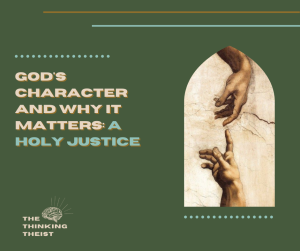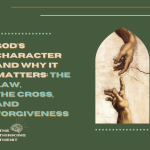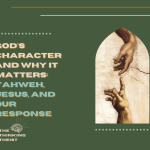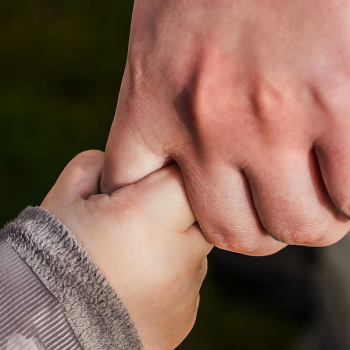God’s Character So Far
Throughout this series, we have taken a look at the character of God and how we should respond. In the first article, I introduced two main ideas: how we think about God should affect how we think about everything and as image bearers of God, it is important to have an understanding of His character. In the second article, we took a more focused look at God’s compassionate and merciful nature and discussed how in light of this shown on the cross, we should extend that same mercy to others.
In the third article, we discussed God’s patience, looking at Noah’s Flood and the removal of the Canaanites as prime examples of God’s patience being shown for a very long time.
And in our last article, we touched on the forgiveness of God, particularly how the sacrificial system pointed to a God who wishes to relate to His people. We ended by discussing the cross of Christ and how Jesus fulfilled the sacrificial system. We no longer need to sacrifice rams or bulls, but are made right in God’s sight by putting our faith in Jesus.
To The Bible
Let’s take a look at our text and see what other trait stands out:
“‘The Lord passed in front of Moses, calling out,
‘Yahweh! The Lord!
The God of compassion and mercy!
I am slow to anger
and filled with unfailing love and faithfulness.
I lavish unfailing love to a thousand generations.
I forgive iniquity, rebellion, and sin.
But I do not excuse the guilty.
I lay the sins of the parents upon their children and grandchildren;
the entire family is affected—
even children in the third and fourth generations.’
Moses immediately threw himself to the ground and worshiped. And he said, ‘O Lord, if it is true that I have found favor with you, then please travel with us. Yes, this is a stubborn and rebellious people, but please forgive our iniquity and our sins. Claim us as your own special possession.’”
– Exodus 34: 6-9
What Do We See?
The focus of this article, will be the section that states:
“But I do not excuse the guilty. I lay the sins of the parents upon their children and grandchildren; the entire family is affected— even children in the third and fourth generations.”
Here we see there are 2 ways that God’s Justice operates:
- The guilty are not excused.
- The sins of parents affect their children and their children’s children.
God’s Love and Judgment
Western culture seems averse to the idea of a just God who is angry toward sin. The idea that God is Love (which is a biblical concept) has been hijacked to mean that God is never angry and that we can do whatever we want with our lives today. Western culture has begun to understand the statement “God is Love” as necessitating the statement “God never judges.” Let’s take this version of God to its logical end.
Logical End
If “God is Love” means that “God never judges,” this means that evil goes unpunished. The genocides of Hitler, Stalin, Pol Pot, and Mao go unpunished. The Hindu Nationalists of India who beat religious minorities go unpunished. The ethnic cleansing of the Uyghurs in China goes unpunished. The arbiters of the slave trade go unpunished. Rapists, child molesters, serial killers, and people that exploit others for sexual gain go unpunished. This is the world that a hijacked “God is Love” idea leads to.
Scripture paints a very different picture of God. God is Love, yes. But God’s love leads Him to act towards sin in a manner that could be understood as a husband jealous for his wife, or a parent defending their children. The Father is angry towards moral actions that break the law that He wrote on our hearts. Broken moral crimes must be met with some sort of consequence, otherwise God contradicts His nature. God is angry at evil actions that affect those He loves: us. For God to be loving, evil cannot be left unpunished.
The Cross and God’s Judgment
Last week, when speaking of God’s forgiveness, we looked at the cross as being a fulfillment of the sacrificial system. As the cross is an example of God’s love, patience, forgiveness, mercy and grace, it is also an example of His wrath and His just nature. Because of the cross of Christ, justice is served because the consequence for sin is taken care of and God’s mercy and grace is shown to us sinners.
To highlight this notion, let’s return to the picture of the suffering servant in Isaiah 53:10-12:
“But it was the Lord’s good plan to crush him
and cause him grief.
Yet when his life is made an offering for sin,
he will have many descendants.
He will enjoy a long life,
and the Lord’s good plan will prosper in his hands.
When he sees all that is accomplished by his anguish,
he will be satisfied.
And because of his experience,
my righteous servant will make it possible
for many to be counted righteous,
for he will bear all their sins.
I will give him the honors of a victorious soldier,
because he exposed himself to death.
He was counted among the rebels.
He bore the sins of many and interceded for rebels.”
What Do We See Here?
In the description of God’s suffering servant, the Messiah, we see that it was God’s desire to crush Him for our sake. Because of His death, Christ would be given honor and glory. The crimes against God’s law would be paid for by the death of Jesus. Paul says it like this to the church in Rome:
“We are made right with God by placing our faith in Jesus Christ. And this is true for everyone who believes, no matter who we are. For everyone has sinned; we all fall short of God’s glorious standard. Yet God, in his grace, freely makes us right in his sight. He did this through Christ Jesus when he freed us from the penalty for our sins. For God presented Jesus as the sacrifice for sin. People are made right with God when they believe that Jesus sacrificed his life, shedding his blood.”
-Romans 3: 21-24a
The cross paid the penalty for our sins. It is by faith in Christ that we are made right with God. Our choice, then, is to place our faith in Christ and His sacrifice on the cross, accepting His resurrection, or remain guilty by continuing to rebel against a holy, just, and loving God. So many people choose the latter. And the guilty are not excused.
Committed Sin and the Children’s Children
Why is sin such a big deal?
Why are my actions so important?
I can do what I want as long as I’m not hurting anyone, right?
The thing about sin is that it doesn’t just affect you personally. Sin affects your relationship with the Lord. Your sins affect your children. And your sins affect your relationships with the people around you.
A life polluted by evil activity, if left unredeemed by the cross, wreaks havoc on the world around us. That’s why sin is such a big deal. It’s not that sin is the denial of some random idea of what “good” is; sin is the denial of the standard of good itself. It demolishes our standing with God, and destroys our relationship with the world around us.
So, besides the cross, how else is sin dealt with?
Yahweh describes it this way:
“I lay the sins of the parents upon their children and grandchildren;
the entire family is affected—
even children in the third and fourth generations.”
-Exodus 34:7b
Is this statement supposing that God punishes children for their father’s sin?
If so, is God justified in that?
Sin and Patterns
Picture a family with a mother, father, and child. Imagine now that the parents, throughout the formative years of their child, continually argued, fought, and abused one another. How do you think this child as an adult will approach a relationship with their spouse?
More than likely, it will be a recipe for disaster.
Or suppose there is a family in which a father and mother continuously abuse drugs and illegal substances. What will become of their child?
The child will probably grow up to have the same addiction to drugs as his or her parents.
The point here is that the patterns of the parents affect the behaviors of their child. But it is not just drugs, emotional, or physical abuse that affects children.
Parents, Child Raising, and Patterns
Parents who do not make loving conversations about spirituality a priority will more than likely raise children who do not care about spiritual matters. Parents who do not make church attendance or membership a priority for their child will probably not raise children that think church is a priority. And parents who do not make it a priority to study the scriptures as a family will more than likely raise children who do not think that the Bible is important. The point is not to guilt parents for dropping the ball here or there. This is to show that patterns in the home affect the worldview that their children leave home with.
When it comes to God laying the sins of parents on their children, it would seem that Yahweh created a pattern that, if executed well, can lead to flourishing… and if abused, can lead to degeneration.
The parents who love and revere the Lord, who work together to be a holy people, and who prioritize God in every facet of their lives are more than likely going to raise children who do the same. Parents that prioritize their own satisfaction, pleasure, and desires over serving the Lord, will more than likely raise children who follow suit.
Conclusion
To put it bluntly, God’s justice is shown through His disdain with sin. After all, if God was not angry towards evil then He would not be ultimately loving and thus, unworthy of worship. God’s justice is expressed twofold. First through the cross of Christ, in which the penalty for sin is paid for. By denying Christ and His work on the cross, people have thus accepted the justice owed them anyway. Second, God’s Justice works within a pattern of cause-and-effect, in which the parents’ sins affect their children. These effects, however, can be redeemed by placing one’s faith in Jesus and working towards reconciliation. Remember, God’s justice does not cancel out His mercy and grace.
In light of God’s justice, let us take the Gospel seriously. We should teach our children and train them to be good ambassadors for the kingdom of God, teaching them to love, serve, and minister to others.














